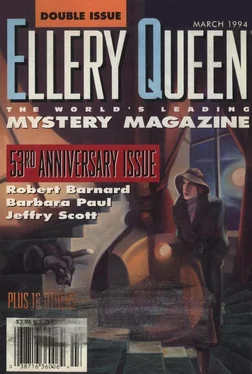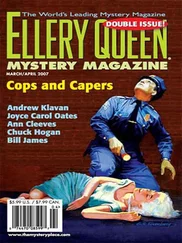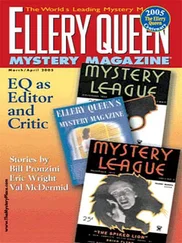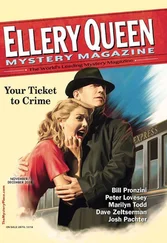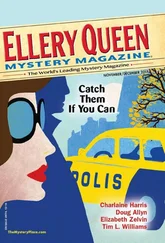William Bankier - Ellery Queen’s Mystery Magazine. Vol. 103, No. 3 & 4. Whole No. 625 & 626, March 1994
Здесь есть возможность читать онлайн «William Bankier - Ellery Queen’s Mystery Magazine. Vol. 103, No. 3 & 4. Whole No. 625 & 626, March 1994» весь текст электронной книги совершенно бесплатно (целиком полную версию без сокращений). В некоторых случаях можно слушать аудио, скачать через торрент в формате fb2 и присутствует краткое содержание. Город: New York, Год выпуска: 1994, ISBN: 1994, Издательство: Dell Magazines, Жанр: Детектив, на английском языке. Описание произведения, (предисловие) а так же отзывы посетителей доступны на портале библиотеки ЛибКат.
- Название:Ellery Queen’s Mystery Magazine. Vol. 103, No. 3 & 4. Whole No. 625 & 626, March 1994
- Автор:
- Издательство:Dell Magazines
- Жанр:
- Год:1994
- Город:New York
- ISBN:ISSN 1054-8122
- Рейтинг книги:5 / 5. Голосов: 1
-
Избранное:Добавить в избранное
- Отзывы:
-
Ваша оценка:
- 100
- 1
- 2
- 3
- 4
- 5
Ellery Queen’s Mystery Magazine. Vol. 103, No. 3 & 4. Whole No. 625 & 626, March 1994: краткое содержание, описание и аннотация
Предлагаем к чтению аннотацию, описание, краткое содержание или предисловие (зависит от того, что написал сам автор книги «Ellery Queen’s Mystery Magazine. Vol. 103, No. 3 & 4. Whole No. 625 & 626, March 1994»). Если вы не нашли необходимую информацию о книге — напишите в комментариях, мы постараемся отыскать её.
Ellery Queen’s Mystery Magazine. Vol. 103, No. 3 & 4. Whole No. 625 & 626, March 1994 — читать онлайн бесплатно полную книгу (весь текст) целиком
Ниже представлен текст книги, разбитый по страницам. Система сохранения места последней прочитанной страницы, позволяет с удобством читать онлайн бесплатно книгу «Ellery Queen’s Mystery Magazine. Vol. 103, No. 3 & 4. Whole No. 625 & 626, March 1994», без необходимости каждый раз заново искать на чём Вы остановились. Поставьте закладку, и сможете в любой момент перейти на страницу, на которой закончили чтение.
Интервал:
Закладка:
Ellery Queen’s Mystery Magazine. Vol. 103, No. 3 & 4. Whole No. 625 & 626, March 1994


Soldier, from the Wars Returning
by Robert Barnard
© 1994 by Robert Barnard
A former professor of English Literature, Robert Barnard still devotes time to literary pursuits outside his own writing. Together with his wife Louise, he has served for several years on the Council of the Bronte Society, where one of their concerns has been the preservation of the Bronte parsonage and grounds in Haworth, England. Mr. Barnard’s short stories frequently employ historical settings, as does this one, set just after World War I...
I have a photograph of my grandfather — my real grandfather — in the uniform of the King’s Own Yorkshiremen, taken on leave in 1917, when he had finished his weeks of training and was about to be sent to France. He gazes out into the camera — young, confident, even cocky. I have been told that young soldiers were encouraged to have such pictures taken, ostensibly on the grounds that they encouraged smartness and pride in the regiment, in fact because their officers suspected that the photograph would soon be all that the family had to remember them by.
But this was not the case with my grandfather, Jimmy Larkins. He bucked the statistics. He served in France and Belgium for eighteen months and only sustained a minor wound in the final push of the autumn of 1918. He also survived the flu epidemic of 1919, that final dirty trick of the President of the Immortals. On his demob he got a job as a baker’s roundsman in his hometown of Armley, and he put the war behind him.
On the surface, at least. I do not believe that any normally sensitive person could go through those hellish years entirely unchanged. He had not sunk, suffocating, into the mud, he had not been shot as he clambered over the ridge of his trench, but he had seen hundreds who had, had known them. What Jimmy Larkins would have been like if he had grown up normally in peacetime no one can now know. As it was, he seems to have come home with an urge to make up for lost time, perhaps even to live a little for the lads who had not come home.
And there were plenty of women and girls in the Armley area who were willing to help him do it: women whose husbands had not come home, girls whose potential husbands were remembered collectively on Armistice Day, women whose husbands had come home crippled or haunted — and, indeed, women whose husbands followed the normal northern working-class tradition that the husband’s leisure time was spent boozing with his mates while his wife stayed home to cook, clean, and mind the children. There were lonely, unhappy, dissatisfied women aplenty in Jimmy Larkins’s Armley, and he did his best to bring a little joy into their lives. It was rumoured that at moments of climax he would cry “That’s one from Archie Hoddle!” or “That’s for you, Robbie Robson!” — all the names of mates of his who had never come home from France to sow their own wild oats.
This was a rumour, as I say, for this was not the sixties, when privacy and reticence were dirty words and happiness was thought to flow from endless talk about one’s sexual proclivities and activities. This was the twenties, when you kept yourself to yourself, and all but the outcast families maintained a wall of respectability between themselves and the outside world.
But if the ladies did not discuss among themselves what Jimmy did or did not say when he was reaching climax with them, they did show their knowledge of his activities obliquely, in jokes. “What she needs is a visit from Jimmy Larkins,” they would say of a sour spinster, or “Serve your man right if you started asking Jimmy Larkins in,” they would tell a neglected wife. After a time they started hinting that they could see his features in the babies that were born. “I don’t like the look of that snub nose,” they would say, or “Who does that high forehead remind me of?” Thus, in ritual jokes, did the women of Armley reveal their awareness of my grandfather’s doings in the neighbourhood without their ever acknowledging that he had brought to them personally, along with the bread, that other staff of life.
The women, as I say, could joke about it. Some, no doubt, wanted more from the relationship and became emotional and demanding, but Jimmy had his ways of avoiding commitment. When asked why he had never married, he always said briefly: “It wouldn’t be fair.” I take him to have been good-hearted and promiscuous, fleeing mentally from the blackness of those months in France. For a time, perhaps even the men of Armley understood.
But the men never treated it as a joke, and as the twenties turned into the thirties, they found that the whole business was becoming very sour indeed. These men had a pride in paternity as fierce as that of any aristocrat, and they added a sense of possession — exclusive possession — of a wife that boded ill both for the wives themselves and for Jimmy. The fact that they spent their evenings and weekends in pubs gave no sort of leeway to the wives they left cooped up with a brood within four walls. Their suspicion and anger found its own form, and it was not jocular. “Someone should take a knife to that randy bastard,” they would mutter into their pint mugs, or “I’d like to get that bugger up a back alley some dark night — I’d know what to do to him.”
Their rage and frustration was dynastic too: they looked at their children, and particularly their sons, and they wondered if they were the fathers. They studied features, even pondered their characters and tastes, and wondered “where they got that from,” as if that were a scientific study and could give them certainty one way or the other. In the end, they usually subsided into a boiling uncertainty which found occasional outlets in violence to their wives or their offspring.
Usually, but not always. They were simple men with strong, not always rational, feelings and a fierce pride. Their manhood was their most precious possession, and if they felt it impugned, they became enraged. They loved certainties and feared doubt. To live in uncertainty, permanently, was to them barely tolerable. Some of them, discussing the matter over the years, first in hints and ambiguities, later with angry directness, determined to do something about it. There were six of them: Walter Abbot, Fred Walmsley, Bill Hoggett, Mickey Turner, Harry Colton, and Peter Huggins. They are names that still crop up in conversations in Armley pubs and clubs, because the crime was a local sensation, something much more than a nine-days’ wonder, and the men — and, inevitably, their wives — became the objects of finger-pointing that lasted the rest of their lives.
In spite of the violent prognostications of the Armley men, they did not decide to castrate Jimmy. Something in them shrank from that, as it did not shrink from murder. They decided to kill him in such a way that all of them must be under suspicion, but no one would be able to decide which had done it.
What may seem odd, even ironic, today is the game they chose as a cover for the murder. Bowls has nowadays a gentle, middle-class, elderly image: it is a game that is played when physical powers have declined and all passions are spent. But many working men in the thirties played bowls: a relaxing game after a day of hard, physical work. Four of the men were good players, and the pub where Jimmy Larkins had his pint or two after work was only a hundred yards or so from the Armley Bowling Club. So one autumn evening the six of them turned up, casually and separately, in the Waggon of Hay, bought Jimmy an extra pint, and finally set out for a game of bowls with Jimmy as umpire. Whether Jimmy, as he rolled off with them, was secretly cock-a-hoop that he had cuckolded every one of them I do not know. I hope not — I hope he regarded his relations with their womenfolk in a different light from that. But we shouldn’t try to endow the people of a past age with our own ideological baggage.
Читать дальшеИнтервал:
Закладка:
Похожие книги на «Ellery Queen’s Mystery Magazine. Vol. 103, No. 3 & 4. Whole No. 625 & 626, March 1994»
Представляем Вашему вниманию похожие книги на «Ellery Queen’s Mystery Magazine. Vol. 103, No. 3 & 4. Whole No. 625 & 626, March 1994» списком для выбора. Мы отобрали схожую по названию и смыслу литературу в надежде предоставить читателям больше вариантов отыскать новые, интересные, ещё непрочитанные произведения.
Обсуждение, отзывы о книге «Ellery Queen’s Mystery Magazine. Vol. 103, No. 3 & 4. Whole No. 625 & 626, March 1994» и просто собственные мнения читателей. Оставьте ваши комментарии, напишите, что Вы думаете о произведении, его смысле или главных героях. Укажите что конкретно понравилось, а что нет, и почему Вы так считаете.
